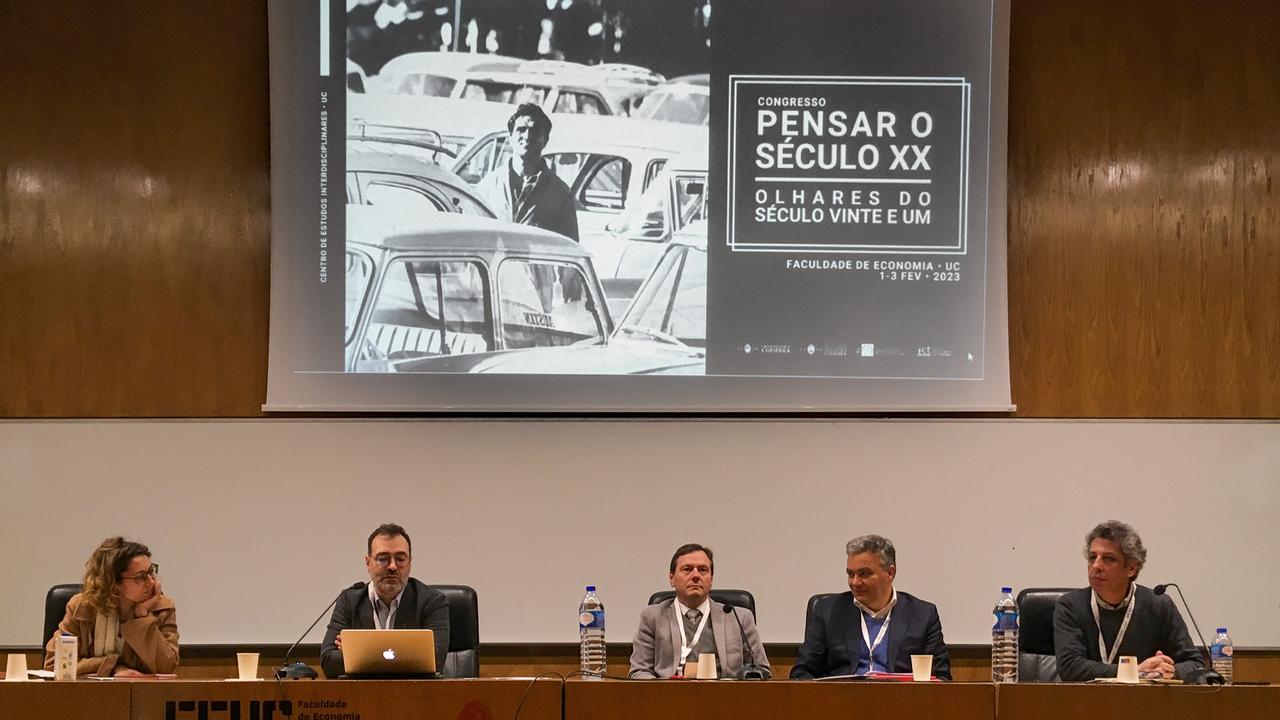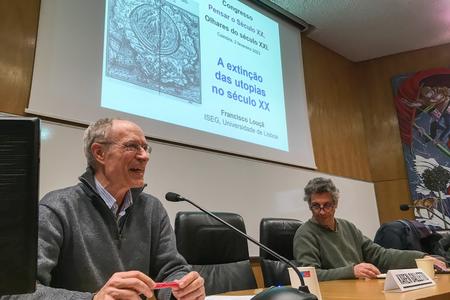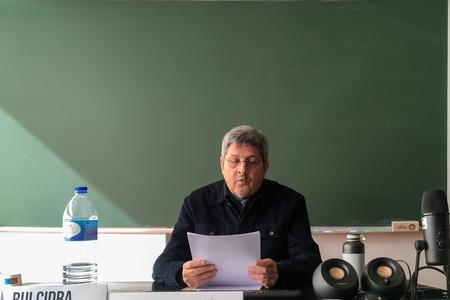Congresso Internacional Pensar o Século XX — Olhares do século vinte e um

O Congresso Internacional "Pensar o Século XX. Olhares do século vinte e um" reuniu vários/as investigadores/as e oradores/as convidados/as, como Franco “Bifo” Berardi, Lília Moritz Schwarcz, Odd Arne Westad e Vanessa Schwartz, para discutir e refletir sobre o século XX e o seu impacto no século XXI.
Os oradores convidados permitiram-nos discutir temas como cultura, história, política e economia. Franco “Bifo” Berardi, por exemplo, abordou o impacto do sistema capitalista nas subjetividades contemporâneas, afirmando que apenas a deserção e a recusa coletivas podem constituir o caminho para uma mudança contra o “abismo” da atualidade. Já Lília Moritz Schwarcz falou sobre as grandes “marcas” que determinaram o início de um novo século, como as Grandes Guerras, a apelidada “Gripe Espanhola”, que foi no início do século passado acompanhada de um boom de vendas de cloroquina, e como se viveu então num tempo anacrónico, de notícias fabricadas e fotografias manipuladas pelos regimes autoritários, estabelecendo um paralelismo muito claro com o século atual.
Odd Arne Westad abordou o caso das reformas económicas Chinesas dos últimos anos do século XX e a forma como moldaram totalmente o mercado económico global neste início de novo século, enquanto Vanessa Schwartz falou sobre a conceção do tempo no século XX, e em particular como o cinema mudou a perceção temporal, apelidando os anos 50 de “The Jet Age”, com uma forte influência na sociedade contemporânea.
O congresso foi igualmente um momento para os/as investigadores/as apresentarem o seu trabalho e trocarem ideias e opiniões com outros/as investigadores/as e alunos/as. Todos/as os/as participantes debateram sobre aspetos relevantes da história do século XX, nas várias áreas da sua investigação: história e memória, história da arte, estudos culturais, artísticos e literários, filosofia, ciências da comunicação, pedagogia, humanidades digitais, economia e ciências sociais, estudos do clima e do ambiente, ciências naturais e tecnologia, estudos urbanos e das mobilidades.
O CEIS20 e a Comissão Científica do Congresso agradecem o acolhimento da FEUC a este evento, e também a participação de todos os intervenientes, em especial ao seus quatro oradores convidados, e a Cláudia Cavadas (Vice-Reitora para a Investigação e o 3º Ciclo, UC), Delfim Leão (Vice-Reitor para a Cultura e a Ciência Aberta, UC) e Álvaro Garrido (Diretor da Faculdade de Economia, UC).
Relembramos que está aberta, até 31 de março, a submissão de propostas para a Revista Estudos do Século XX, sob o mesmo tema do Congresso, e aceita artigos em inglês, português, francês ou espanhol.
The International Congress “Thinking the Twentieth Century. Perspectives from the twenty-first century” brought together several researchers and key-note speakers, such as Franco “Bifo” Berardi, Lília Moritz Schwarcz, Odd Arne Westad and Vanessa Schwartz, to discuss and reflect on the twentieth century and its impact on the twenty-first century.
The key-note speakers opened exciting discussions on culture, history, politics and economics. Franco "Bifo" Berardi, for example, addressed the impact of the capitalist system on contemporary subjectivities, arguing that only collective desertion and rejection may constitute forms of resistance to the current "abyss". Lília Moritz Schwarcz spoke about the great "marks" of the early twentieth-century, such as the Great World Wars, the so-called "Spanish Flu", which was already accompanied at the time by a boom in the sales of chloroquine, and how the period experienced a sense of anachronistic time, of fabricated news and manipulated photographs by authoritarian regimes, establishing a very clear parallel with the current century.
Odd Arne Westad dealt with the case of the Chinese economic reforms taking place in the final years of the 20th century and how these completely shaped the global economic market in this beginning of the new century, while Vanessa Schwartz spoke about the conception of time in the 20th century, and in particular how cinema changed the perception of time describing the 50’s as a "The Jet Age”, with a strong influence on contemporary society.
The congress was also a moment for researchers to present their work and exchange ideas with other researchers and students. All participants discussed relevant aspects of 20th century history, in the various areas of their research: history and memory, art history, cultural, artistic and literary studies, philosophy, communication sciences, pedagogy, digital humanities, economics and social sciences, climate and environmental studies, natural sciences and technology, urban studies and mobility.
The CEIS20 and the Scientific Committee of the Congress would like to thank FEUC for hosting this event, and also the participation of all the speakers, especially its four guest speakers and Cláudia Cavadas (Vice-Rector for Research and 3rd Cycle, UC), Delfim Leão (Vice-Rector for Culture and Open Science, UC) and Álvaro Garrido (Director of the Faculty of Economics, UC).
We remind you that it is open, until March 31st, the submission of proposals to the Twentieth-Century Studies Journal, under the same theme of the Congress, and it is accepting papers written in English, Portuguese, French or Spanish.


















